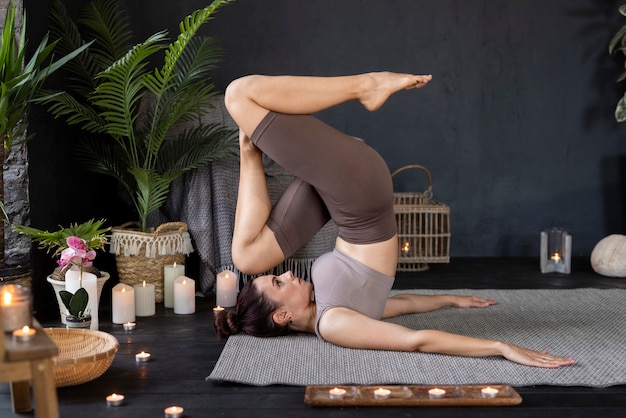
A yoga body isn’t just about flexible limbs. The ancient practice of yoga can boost memory, heart, and bone health, according to Anna Magee. In the UK, people are now spending around £790 million annually on yoga classes and mats. While yoga techniques get more varied with time, like rage yoga, naked yoga, and even dog yoga, scientific research continues to highlight its real benefits.
Researchers from UCLA discovered that a three-month yoga and meditation course was more effective than memory exercises in reducing age-related brain decline. Another study found it helped improve sleep in breast cancer survivors.
When Lucy Edge, 53, a former advertising executive, experienced severe depression, she chose yoga over the prescribed antidepressants. She took a six-month break, traveled to India for yoga training, and returned happier and more content. Lucy has since authored three yoga books and founded Yoga Meds, listing over 300 clinical trials showing yoga’s benefits for various conditions, including arthritis, insomnia, and obesity.
Interested in boosting your memory? UCLA research revealed that adults over 55 who practiced yoga and meditation for 12 weeks showed better spatial and visual memory improvements than those doing memory exercises. They also experienced reduced depression, anxiety, and stress.
For heart health, yoga could be just as beneficial as traditional exercises like brisk walking. Research indicates that yoga helps lower heart disease risk by reducing stress, which is a significant contributor. It’s been shown to improve blood pressure, cholesterol, and weight management, which are all factors in heart disease.
Yoga could also ease back pain, with studies showing that it helps reduce pain significantly. The National Institute of Clinical Excellence (NICE) recommends yoga for lower back pain, and it’s known to help with incontinence and increase bone density by targeting pelvic floor muscles.
When starting yoga, inform your instructor of any health issues and begin with gentle styles like Hatha or Iyengar. If you have specific conditions, consult your doctor for possible subsidized yoga courses. Good yoga props can also enhance your practice. Thicker mats are better for joint protection, and taller individuals should opt for longer mats. Lightweight mats with comfortable straps are ideal for easy transport.
Healthista recommends eco-friendly options like the Elephant Cork Yoga mat from Valka Yoga, which combines organic cork and natural rubber for durability, grip when wet, and comfort. Cork yoga blocks are also fantastic for added stability and grip during challenging poses.
Whether you’re flexible or not, yoga can help. For relaxation, try Yin or Restorative yoga. Vinyasa Flow classes offer an energetic pace that links postures to breath. Iyengar yoga focuses on precise alignment and uses props for support. Anusara yoga incorporates flowing movements to upbeat music for an enjoyable session. Yoga Therapy can aid in healing from injuries or illnesses, taught by instructors specialized in therapeutic approaches.
Yoga offers a variety of benefits and can be tailored to fit individual needs and goals, making it a versatile and effective practice for improving overall health and well-being.